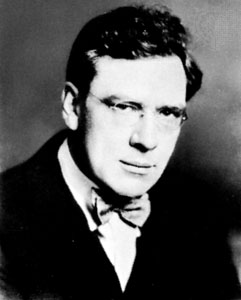-

Chapter 8: American Drama
Maxwell Anderson
1888-1959
Site Links: | Chap. 8: Index | Alphabetical List | Table Of Contents | Home Page |

|
|
Chapter 8: American Drama
Maxwell
Anderson
|
|
Site Links: | Chap. 8: Index | Alphabetical List | Table Of Contents | Home Page |

Winterset: play in three acts, 1935; The masque of kings: a play in three acts, 1937; Knickerbocker holiday: a musical comedy in two acts,1938; Eleven verse plays, 1929-1939,1939; Journey to Jerusalem: a play in three acts, 1940; Lost in the stars; the dramatization of Alan Paton's novel Cry, the beloved country, 1950); Barefoot in Athens, 1951; Bad seed: a play in two acts (the dramatization of William March's novel The bad seed) 1955; Dramatist in America: letters of Maxwell Anderson. edited by Laurence G. Avery, 1977.
Selected Bibliography 1980-Present
Bushnell, Rebecca. ed. A Companion to Tragedy. Malden, MA: Blackwell, 2005.
Engle, Ron, and Felicia H. Londré. Maxwell Anderson on the European Stage 1929-1992; A Production History and Annotated Bibliography of Source Materials in Foreign Translation. Monroe, NY: Library Research Associates, 1996.
Henderson, Cathy. comp. Twentieth-Century American Playwrights: Views of a Changing Culture. Austin: Harry Ransom Humanities Research Ctr., Univ. of Texas, Austin, 1994.
Horn, Barbara L. Maxwell Anderson: A Research and Production Sourcebook. Westport, CT: Greenwood, 1996.
Shivers, Alfred S. The life of Maxwell Anderson. NY: Stein and Day, 1983. PS3501 .N256 Z89
Wheatley, Christopher J. ed. Twentieth-Century American Dramatists, Second Series. Detroit: Thomson Gale, 2000.
Maxwell Anderson was a famous playwright whose contributions to American Drama are well noted. He showed support in the theatres, teaching, and newspaper work. Poetic tragedy was Anderson's ambition as a playwright.
Maxwell Anderson was born in Atlantic, Pennsylvania on December 15, 1888 to William Lincoln and Charlotta Perrimela Stephenson Anderson. He attended the University of North Dakota, and achieved his B.A. in 1911. He continued his education at Stanford University and received his Master's Degree in English in 1914. Anderson married Margaret Haskett in 1911, and together they had three children: Quentin, Alan, and Terence. His second marriage was to Gertrude Anthony after the death of his first wife and they together had a child: Hesper. Outliving two wives, Maxwell married a third time to Gilda Oakleaf. Maxwell Anderson died February 28, 1959, just married five years to Gilda.
The early 1920s brought a new insight to American Drama. Prior to World War I, playwrights were just starting to emerge and New York City became popular for new actors, stage designers and directors. After the war, new audiences emerged to support the contemporary plays. This became a time for young playwrights to show their serious artistic writing.
Anderson's writing reflected mostly tragedies, comedies, and plays in verse and in prose, satires, musicals and social protest. The plays were meant to relate to the outside world, and since the war had ended, the world needed a place for expression. Maxwell Anderson also expanded into writing poetry, and studying Philosophy. In 1925 he published his poetry, Who Have Dreams, which became well known because of the lack of formal experimentation. No matter what his job, he dedicated his life to writing. His main interest remained in traditional literature.
In the fall of 1924, with the production of What Price Glory, Anderson's career as a playwright began. This play reflected a deglamorization of wartime. The language used in this play was blunt and straightforward, eliminating the formalistic dialogue. He used profanity in the dialogue to correspond with the attitudes deplicted in the war--from soldiers to Frenchmen to Englishmen. The high success of this play allowed Anderson to pursue his career as a playwright, and he produced six more plays. "He came to see that verse was an extra tool and that through skillful use of such elements as rythm and imagery and allusion the playwright could increase the impact of a play on its audience." (DLB 7, 28) This helped him achieve his goals of capturing the audience's attention and relating to the audience. Anderson used irony and satire to help his production of four poetic tragedies. Two were based on English history and two were based on American history. Later, his audience related his plays to that of a historical dramatist.
Anderson wrote his plays in the service of hope of improvement and development of the humanity. He focused on dreams and inspirations in developing his plays.
Work Cited
Dictionary of Literary Biography, Twentieth-Century American Dramatists Part 1: A-J Volume 7, 1981 Gale Research Company
MLA Style Citation of this Web Page
Reuben, Paul P. "Chapter 8: Maxwell Anderson." PAL: Perspectives in American Literature- A Research and Reference Guide. URL: http://www.paulreuben.website/pal/chap8/anderson.html (provide page date or date of your login).| Top |